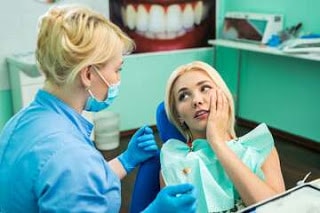A common dental emergency includes when you undergo a toothache, injuries involving your teeth, jaw or mouth like a knocked out tooth, chipped tooth/lost crown or filling, and infections resulting in abscesses and swelling.
A dental emergency is a phrase used to refer to incidences if you have to understand your dentist as soon as you can, and is normally associated with pain.

A toothache
Primarily, rinse your mouth with warm bottled water to remove debris. If your mouth is bloated, put a cold compress on the surface of the cheek. Take over-the-counter (OTC) pain medicines like paracetamol or aspirin (anti-inflammatory ) to attain temporary pain relief. See your dentist as soon as possible to get rid of a toothache.
Toothache is a common dental emergency.
Abscess and Swelling
A dental abscess is wreak havoc due to infection in the tooth or teeth. It can be quite debilitating and can result in facial swelling. If left untreated, the disease can spread to different areas of the human body and might be life-threatening.
Take pain relief medicines like paracetamol or anti-inflammatories for temporary pain relief and also use a cold compress to help control the swelling. Should you see your health care practitioner, then you might be prescribed antibiotics. Nevertheless, this won't eliminate the source of disease and the disease can flare up. It's crucial that you seek immediate dental emergency.
Knocked outside Tooth
A knocked out tooth is a standard dental crisis. In case the pumped out tooth is a baby tooth, don't replant it back in the socket.
Whether an adult tooth is knocked out, pick up the tooth by the crown (a smooth white area that's visible in the mouth). Avoid touching the origin. If the root is dirty, rinse the tooth with saline or milk.
At a dental emergency, every attempt ought to be made to place the tooth back in the socket when possible and visit a dentist immediately. Ideally, this ought to be within one hour of the accident. It's important not to postpone this measure and delay visiting a dentist. When the tooth was put back in the socket, then put a fresh handkerchief over the enamel, and lightly bite it to hold it in place. If You Cannot put the tooth back, the next measures could be undertaken:
- Put the tooth in a cup of milk or saline.
- Don't place it in water since plain water may harm the fragile cells onto the root which will assist the enamel to attach back into the gum.
- If saline or milk isn't available, place the tooth in the mouth between the cheek and the gum. It's critical that your tooth has been kept moist.
- Another strategy is to spit saliva into a container and then immerse the enamel in it.
- Afterward, visit your dentist immediately.
Lost Filling or Crown/Chipped Tooth
In case a crown drops off at a dental emergency, then retrieve the crown and then deliver the crown beside you once you find the dentist. If at all possible, set the crown over the tooth.
In case you've dropped a dental filling, it may be painful since the tooth surface can be sensitive to temperature or atmosphere. Attempt to find the dentist as soon as you can get the filling replaced. This may prevent additional damage to the tooth and also the demand for more extensive therapy.
A chipped tooth may give you a sharp border, and when it is one of your teeth may impact the aesthetics of your grin. Make an appointment with your dentist when possible so they could evaluate the processor and discuss potential treatment alternatives for fixing the issue, whether that is filing back a sharp edge or a recovery.
Infection (accidents impacting your brow, cheek or gums)
Should you encounter harms to the lip, cheek or gums, then apply a sterile bandage or handkerchief into the wound and apply firm pressure to help stop the bleeding.
If the bleeding doesn't stop in 10 minutes, then seek immediate medical care.
Jaw Infection
If you're having difficulty eating or opening your mouth because of jaw pain, seek medical or dental hygiene. From the short term, to help alleviate pain, use a cold compress on the jaw area to reduce swelling and choose anti-inflammatory medications like ibuprofen for pain relief.
When a dental emergency occurs, please contact a dental office near you to talk to their friendly reception team to perform an immediate appointment. If it happens after hours, call the dental emergency number in your local area.
Related Reading:

Isreal olabanji a dental assistant and public health professionals and has years of experience in assisting the dentist with all sorts of dental issues.
We regularly post timely and trustworthy medical information and news on Fitness, Dental care, Recipes, Child health, obstetrics, and more.
The content is intended to augment, not replace, information provided by your clinician. It is not intended nor implied to be a substitute for professional medical advice. Reading this information does not create or replace a doctor-patient relationship or consultation. If required, please contact your doctor or other health care provider to assist you to interpret any of this information, or in applying the information to your individual needs.


